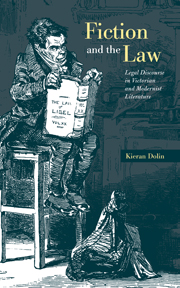Book contents
- Frontmatter
- Contents
- Acknowledgments
- 1 Narrative forms and normative worlds
- 2 The modern Western nomos
- 3 True testimony and the foundation of nomos – The Heart of Midlothian
- 4 Reformist critique in the mid-Victorian “legal novel” – Bleak House
- 5 Representation, inheritance and anti-reformism in the “legal novel” – Orley Farm
- 6 Power, chance and the rule of law – Billy Budd, Sailor
- 7 From sympathetic criminal to imperial law-giver – Lord Jim
- 8 Freedom, uncertainty and diversity – the critique of imperialist law in A Passage to India
- 9 Settling out of court
- Notes
- Index
3 - True testimony and the foundation of nomos – The Heart of Midlothian
Published online by Cambridge University Press: 18 December 2009
- Frontmatter
- Contents
- Acknowledgments
- 1 Narrative forms and normative worlds
- 2 The modern Western nomos
- 3 True testimony and the foundation of nomos – The Heart of Midlothian
- 4 Reformist critique in the mid-Victorian “legal novel” – Bleak House
- 5 Representation, inheritance and anti-reformism in the “legal novel” – Orley Farm
- 6 Power, chance and the rule of law – Billy Budd, Sailor
- 7 From sympathetic criminal to imperial law-giver – Lord Jim
- 8 Freedom, uncertainty and diversity – the critique of imperialist law in A Passage to India
- 9 Settling out of court
- Notes
- Index
Summary
Sir Walter Scott combined writing with a career in the law, as an Advocate of the Scottish Bar, as Sheriff-Depute of Selkirkshire and as a Clerk of the Court of Session. His dual career arose out of the culture of eighteenth- and nineteenth-century Edinburgh, a dominant aspect of which was the interrelated practice of the discourses of law and literature. An account of this inter discourse will serve as the context for a reading of the representation of law in The Heart of Midlothian (1818). Significantly, as the first in this sequence of studies, it is a novel of the foundation of nomos, one in which the establishment of a single family in peace and prosperity functions as a figure for the expulsion of disorder and the creation of a state of supremacy of law in Scotland. The advent of a recognizably modern normative world is announced by the critique of an archaic, punitive and formalistic law relating to child murder. The “rule of law” is represented as emerging from the experience of rebellion, madness and crime. The Heart of Midlothian therefore offers a complex narrative of the law in history and the law as ideal.
In his Life of Lord Jeffrey (1852), Henry Cockburn wrote that the Scottish legal profession's “higher practice has always been combined with literature, which indeed is the hereditary fashion of the profession. Its cultivation is encouraged by the best and most accessible library in this country, which belongs to the bar.”
- Type
- Chapter
- Information
- Fiction and the LawLegal Discourse in Victorian and Modernist Literature, pp. 45 - 70Publisher: Cambridge University PressPrint publication year: 1999



